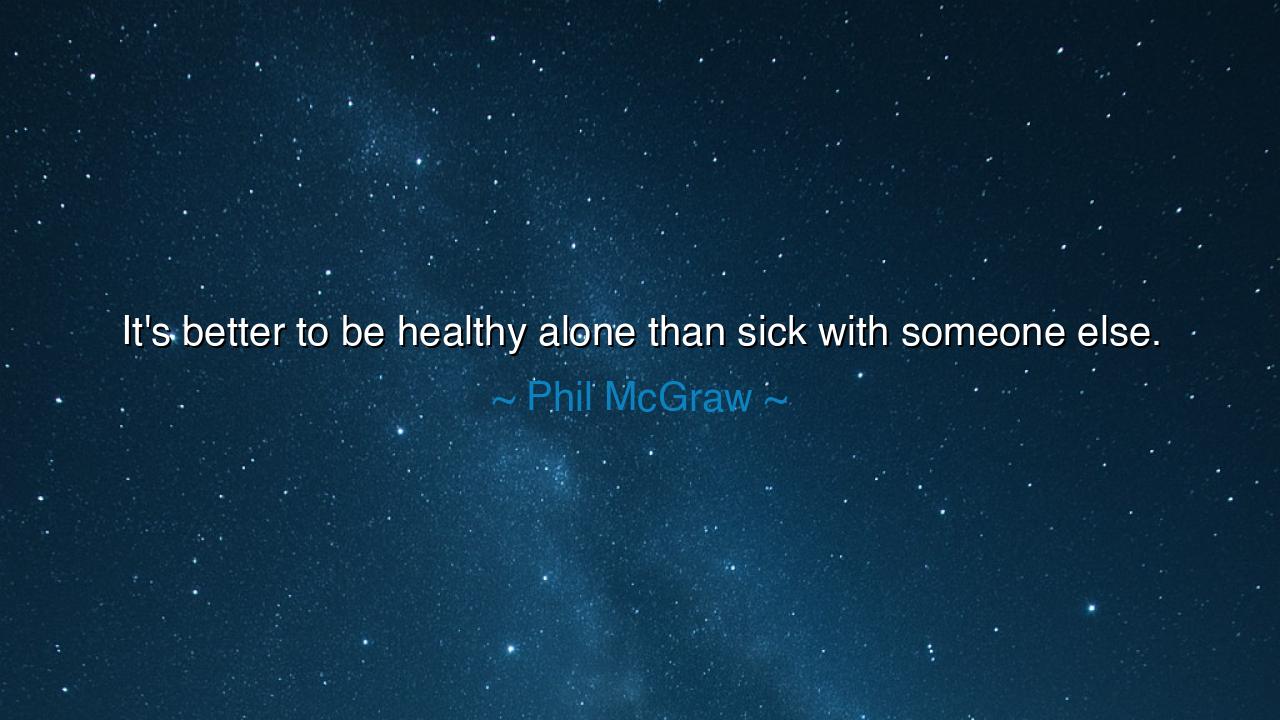
It's better to be healthy alone than sick with someone else.






"It's better to be healthy alone than sick with someone else." These words from Phil McGraw, also known as Dr. Phil, contain a powerful truth about personal well-being and the profound effects that relationships—whether with friends, family, or romantic partners—can have on our health. At first glance, this might seem like a stark, almost selfish view, but in reality, it is a reflection of the ancient wisdom that speaks to the importance of self-care and the necessity of protecting one's own mental and physical health. McGraw's statement is not merely about avoiding illness, but about recognizing that being in a toxic or unhealthy relationship can be just as harmful—if not more so—than facing loneliness.
In the ancient world, the greatest philosophers spoke often of the balance required to live a healthy life, one where the body, mind, and soul were in harmony. Aristotle, in his work on ethics, believed that living a good life was not only about virtue but also about choosing relationships that allowed for growth and peace. He understood that if we choose companions who lead us into stress, bitterness, or unhealthy patterns, we might find ourselves sick of mind and body, consumed by the demands and negativity that come from being bound to another who does not bring us peace. Just as a poisonous plant can wither the soil around it, a harmful relationship can drain the life force from an individual, leaving them spiritually and physically depleted.
Consider the story of Marcus Aurelius, the great Roman emperor and philosopher, who understood the importance of self-reflection and guarding one's inner peace. Despite his power and influence, Aurelius found time to be alone, to meditate on his thoughts, and to protect his mental health from the stresses of leadership. He did not seek validation from others, nor did he allow himself to be consumed by toxic relationships. His example serves as a reminder that sometimes the healthiest choice is not to surround oneself with people, but to seek solitude for self-preservation. In his writings, particularly in his Meditations, Aurelius reflects on the need to protect the sanctity of the mind—an essential form of health that can easily be undermined by unhealthy external influences.
Dr. Phil’s statement echoes this idea that our well-being is something we must guard at all costs. Health, in its truest form, is not simply the absence of physical illness but the presence of a peaceful mind, a balanced spirit, and a nurtured soul. To be alone, in this context, does not mean to be isolated in a desolate sense, but to choose a kind of solitude that nurtures your inner peace. Being alone allows one to focus on self-growth, to tend to one’s health without the strain of emotional burdens that come with unhealthy relationships.
Think of Helen Keller, who, despite being both blind and deaf, found her strength in solitude and in relationships that nurtured her growth and independence. Helen had the wisdom to surround herself with those who encouraged her, like her teacher Anne Sullivan, and avoid people or situations that would have hindered her progress. She knew that in her fragility, she could not afford the luxury of relationships that would detract from her health—mental or physical. Her story shows us that it is better to stand firm in one’s solitude, thriving in self-sufficiency, than to be entangled in relationships that steal from one’s peace and vitality.
The lesson, then, is clear: the quality of our relationships profoundly affects our health. We must be cautious in how we invest in others. If a relationship—be it familial, romantic, or platonic—drains us, poisons our peace, or compels us into unhealthy patterns, it is better to be alone than to continue suffering. In the end, a toxic relationship is not worth the sacrifice of your well-being.
In practical terms, this means that we must take responsibility for our own health. This doesn’t mean rejecting all relationships but rather being discerning about the ones that truly nourish us. If we find ourselves in relationships that cause stress, anxiety, or emotional turmoil, we must be brave enough to create boundaries, to distance ourselves when necessary, and to choose solitude when that is the healthiest option. By doing so, we protect our mental peace and emotional stability, ensuring that we remain strong, whole, and healthy, ready to engage with the world and others in a balanced, positive way. It is only from a place of health—physical, emotional, and spiritual—that we can offer the best of ourselves to the world.






AAdministratorAdministrator
Welcome, honored guests. Please leave a comment, we will respond soon